Problème résolu
Nous, organisations et citoyens soussignés, refusons que l’aide aux migrants soit considérée comme un délit.
Nous sommes scandalisés par les mises sur écoute, les intimidations et les arrestations de bénévoles.
Nous soutenons et soutiendrons toutes celles et ceux qui sont ou seront inquiétés par les autorités pour avoir tendu la main à des hommes et des femmes innocents, abandonnés dans nos fossés par les États européens.
Nous demandons la mise en place d’une nouvelle politique de l’immigration, une politique à visage humain, soucieuse de la dignité et des libertés de chacun.
Le drame de l’après-Sangatte a trop duré.
À Norrent-Fontes, le 28 février 2009
Organisations signataires :
Amnesty international, ANAFE, L’Auberge des migrants, La Belle Etoile, Collectif d’aide aux migrants de Angres, CSP 59 (membre de la coordination nationale des sans-papiers), C’SUR Calais, Emmaüs Saint-Omer, Ligue des Droits de l’homme Boulogne, Ligue des Droits de l’homme France, Médecins du monde, RESF 59/62, RUSF 59/62, SALAM Nord/Pas-de-Calais, Secours catholique Saint-Omer, association Solidarité Migrants (Oise), Terre d’errance Norrent-Fontes, Terre d’errance Steenvoorde
Site internet du manifeste : http://manifestemigrants.wordpress.com/
The migrants of Calais
Top from left: Salam Aid worker distributes bread; the film Welcome angered the French government; migrant washes himself in cold water in Calais. Bottom from left: British group No Borders has plastered Calais with posters, its attempt to hold a demonstration drew 500 police; migrants wait for the evening meal station to open near the Calais docks.
Jonathan and Marie-Jo, Anglo-French reporting team, have been to Calais to investigate the situation of migrants in the port & tunnel portal zones. Here is a very brief summary of the trip:
In January 2010, an extremely complex situation is revealed in Calais. It has been a cold winter and Canute-like efforts by French and British authorities to disrupt the tide of migrants do not seem to have stopped more from arriving at the channel ports, hoping to reach the promised land of Britain. The exiles come mainly from zones of conflict, mostly Afghanistan, Iraq, Somalia, Sudan and Kurdistan. The migrants are 95% male, and have an average age of about 22, although some of them are children.
This is a story replete with bitter ironies. The policies of the British and French governments may not have kept the exiles at home but the officials have succeeded in making migrant lives more miserable, once they are in Calais.
It might be asked from a saloon bar in the UK, why would the migrants think that Britain was a land of milk and honey? None of them will qualify for welfare. Jobs are scarce and they are forbidden to work hence forced if they can find a job into the most marginal and exploited employment.
Improved security on the tunnel and around the port has made it harder to cross and the bribes more costly.
There have been well-mediatised efforts to destroy and disrupt migrant camps, but now there are more of them, and smaller, as the migrants have dispersed.
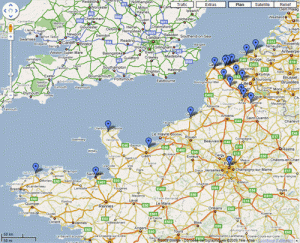
Pins mark ‘jungle’ settlements
The migrants are now all along the coast in Bologne certainly but as far south as Caen and north into Belgium. Many have moved inland to autoroute lorry parks (‘aires’) where they attempt to find concealment among cargoes destined for Britain and others are biding their time alongside the Canal St Martin in Paris.
With no legal status in France, but all the normal basic human needs , the migrants present policy dilemmas and political pressures as well as ignite defiant acts of generosity. This isa country that boasts that it is a land of welcome and asylum, yet the National Front remains a potent political force and Sarkoszy’s ruling UMP is obsessed with ‘Frenchness’. Polls do not show huge sympathy for migrants. The political and legal conflicts and problems are multiple.

In France it is illegal to help illegal migrants and worst of all to provide accommodation or to host a migrant. «Toute personne qui aura, par aide directe ou indirecte, facilité l’entrée, la circulation ou le séjour irrégulier d’un étranger en France, sera punid’un emprisonnement de cinq ans et d’une amende de 30 000 euros.» (L’article L622-1 du Code de l’entrée et du séjour des étrangers).
Nevertheless, there are defenses to this seemingly endlessly vague and broad law, and seeming exceptions.
If anyone is breaking the law they include the socialist regional government which is subsidising relief efforts, and even the UMP mayor of Calais, who is providing a space for the migrants to receive meals. Many other organisations and individuals are also defying this law. Others are operating in shadier territory.
The police have the ability to arrest anyone they like in France and hold them incommunicado in the squalid conditions of garde a vue for 48 hours, and they have used this power against selected activists in Calais.
The contradictions and cruelties of the migrants of Calais are the theme of Phillipe Lioret’s Welcome (2009), a gritty example of filmaking that tells the wider story of the migrants through the tale of just one. It is not necessary to speak much French to understand the film that in any case includes numerous passages in English.Welcome was condemned by the French ‘national identity’ minister Eric Besson, a former socialist whose former colleagues believe has sold his soul to the devil to become a minister in Sarkozy’s government.It is now many months since the film was released but the conflicts in policy exposed by it remain acute.
Activities by NGOs and charities working in Nord-Pas de Calais are loosely coordinated by the C’SUR (Collectif Soutien d’Urgence aux Réfugiés) coordinated by the activist priest, l’abbé Boutoille, who is a strong critic of the government’s national identity policies.
We saw in action: Association Belle Etoile (lunch time meals); association Salam (morning tea, evening meals, clothing, blankets, tents and first aid). We also encountered observers from the UNHCR and France – Terre d’Asiles. Other organisations involved in helping migrants to have basic human rights: Secours Catholique : Showers & sanitation; Transportation of migrants to PASS (Permanence d’Accès aux Soins et à la Santé); paperwork for acquiring political refugee status or “demandeurs d’asile” asylum seekers. MDM (Médecins du Monde). Auberge des Migrants (help Belle Etoile with lunches)
CADA (Commission d’Accès aux Documents Administratifs ); No Borders – agitate for political rights of migrants; Le GISTI (Groupe d’Information et de Soutien des (Travailleurs).
In Bailleul (near Lille), a hospital has accommodation available for migrants who are recovering from serious illnesses and surgeries.
Although it seems that each NGO has its specific task, tensions have been mentioned (political, personality clashes, and competition to attract media attention) .
Other participants in this drama include of course several police forces which have their own rivalries, priorities and political masters,
Recently, British and French ministers including Besson visited an enhanced joint migrant intelligence center with headquarters at Kent Police offices in Folkstone. This includes a French officer as well as officers from the UK Border Agency and one must presume others unmentionable. The British and French also share the cost of migrant deportation flights to Afghanistan.
On the French side, strong deployments of CRS and National Police and Gendarmes surveil and control migrants and sometimes arrest them. Physical mistreatment of migrants by the police has been repeatedly alleged.
The French mobilised 500 police to control a street protest in the Calais area sponsored by No Borders,.
There are further British support groups interested in the situation. A British lawyer is coming to Calais soon to advise migrants.
NoBorders alleges police brutality towards the migrants. Migrants are themselves the victims of criminals especially of the ‘mafia’ of passeurs who promise to arrange passage to England in return for cash. There is no evidence that the police interest in the migrants has translated into prosecutions brought against these passeurs.
Calais is in a fascinating and extraordinary corner of France that has inspired writers and artists from Danny Boon to Emile Zola. This is the land of the Ch’tis – influenced by Flanders, England and its position at the portal of the channel tunnel (tunnel sous la Manche) as well as a thriving ferry port.
Coal and lacemaking have lost importance here but the port and tunnel are booming and Calais is a major entrepôt with millions of tons of freight passing by rail and truck to and from the UK. This is the short crossing to the UK dense with vehicles and the magnet for those seeking entry into Britain.
Who these people are, what they want, where they are from, and how they got here, is not always clear. Some of them are doubtless not the people one might wish taking up residence. Others are surprisingly personable. No easy answers.
Calais migrant solidarity blog in English here
France – pays d’accueil
Calais – 22 January, 2010
Not like the brazen giant of Greek fame,
With conquering limbs astride from land to land;
Here at our sea-washed, sunset hates shall stand
A mighty woman with a torch, whose flame
Is the imprisoned lighting, and her name
Mother of Exiles. From her beacon hand
Glows world-wide welcome; her mild eyes command
The air-bridged harbor that twin cities frame.
“Keep, ancient lands, your storied pomp!” cries she
With silent lips. “Give me your tired, your poor,
Your huddled masses yearning to breathe free,
The wretched refuse of your teeming shore,
Send these, the homeless, tempest-tost to me,
I lift my lamp beside the golden door!
-“The New Colossus” by Emma Lazarus
Zoé’s Ark; Sarko’s drowning

Zoé’s Ark drops the Elysée in the deepest of African fiascos. French nationals are being held in Chad where they are threatened with 20 years in jail for allegedly kidnapping children from Darfur.
Chad’s president, Idriss Déby, has played a blinder with the rhetoric. He says the French may even have planned to kill the children and harvest their organs. Sixteen Europeans including nine French citizens are now being held in the affair. And this, as a seemingly deranged Sarko is on his way to Washington for what was to have been a triumphant reunion with his friend George Bush.
By any standards Déby, a French-educated kleptocrat, election-rigger and warlord whose controversial son was recently mysteriously killed in Paris, has pulled off a magnificent coup de théâtre, not so much striking a blow against the snooty French, but grabbing Sarkozy by the nuts and squeezing.
In addition to the pretty French nursemaids and their helpers he holds three journalists and seven Spanish air crew. And a Boeing 757. So kerching! It’s pay day for Déby. Sarko, meanwhile, looks deranged and not at all the man in charge of even his own emotions after storming out of an interview with 60 Minutes, after he was asked about, er, Her.
He unwisely staged his tantrum in the presence of Lesley Stahl, one of the grandest dames of American TV news. Asking about Cecilia may have been impertinent but it was certainly predictable. So why was Sarko not prepared? He had already called his press secretary an “imbecile” for having wasted his time by scheduling the interview on a busy day. Such self-revelation is not the calm, collected, controlled behaviour of a statesman. Not even if Sarko is right and it is true that the American media are utterly debased in their obsession with sex and celebrity over substance.
As if this was not bad enough, now Sarko is being made to look like a goat by an African thug who is never off French television without poisonous declamations in immaculate French. So much for the brotherhood of Francophonie.
One can imagine Sarko’s mood on the Presidential Airbus on his way to Andrews AFB. Whether this is just an affair of an inept NGO, as Sarko might wish us to believe he believes, it has turned into an affair of hostage-taking. The French public will not tolerate their girls being thrown into a malarial African prison. Sarkozy knows it. Chad knows it.
The children be damned; they are actually practically the least important consideration of all. Were the children from Darfur? How will anyone ever know? Were Zoés people offering these children a worse life? Most people in that part of Africa can only dream of going to France. Perhaps the paperwork was dodgy. I would prefer to cast my own sympathy with the NGO. They knew what they were doing was dangerous. But they may have underestimated the political cynicism of the regime in Chad, not to forget the political cynicism in Paris.
You do not need to be a Lacanian analyst to understand the political toxicity of this for Sarko. This is an affair ripe with symbolism.
What is Sarko going to have to pay to get the French team home? What does Chad want? Guns? Jets? Helicopter gunships? Prime real estate in Neuilly? Cash – obviously.
The swaggering performance of the Africans is an ironic tribute to Sarko’s own default posture but with the whip firmly in the hand of the Africans. This is a media nightmare for the French government. Chad has complete control of the media on their end, they will control the images, hence the French media, and can create any facts they want. This is a very big problem for Sarko, demanding a coolness that one must increasingly doubt he possesses.
Sarko needs to get a grip.
Lots of stereotypes shattered…
and lots of new writers
The Lots of Big Ideas (LOBI) blog aims to counter media distortions of asylum issues, says Sophie Nicholls, editor of the remarkable blog fostered by the Medical Foundation for the Care of Victims of Torture.
“Our wiki is a space where asylum-seekers and refugees – people who don’t usually have a voice – can make their stories heard. These are stories about what it’s really like to be an asylum-seeker; stories about why people end up leaving their home and loved ones to seek asylum in a strange and often unwelcoming place. Many of our contributors are members of the Write to Life group at the Medical Foundation for the Care of Victims of Torture; but we want to encourage anyone to add their voice here.”
Here is an example.
Not Enough Tears
by Jean Kabongo
I wrote this after tears were shed in the group, prompting a discussion about men crying.
I would like to share an African proverb: a crocodile comes out of the lake to enjoy the sun and suddenly it starts raining, and the crocodile runs from the rain back to the lake
I remember days when rain fell in my life. One time after 80 days of war in Katanga, in the DRC, my mum died and some of her brothers came to the monastery where I was staying since the age of 11. They came to tell me that my mother was dead. I just looked at them without any emotion like they didn’t tell me any bad news; they were confused. They left me, but at the gate after a little consultation with each other, they came back to me to make it clear. ‘We just said that your mum is dead.’
What is all this about going and coming back with the same news? The expectation of the African is that when someone close like Dad or Mum, or even a close relative, dies, you have to cry and mourn, shave your head and wear black clothes.
By not crying, it doesn’t mean that I don’t have compassion or emotion, but just that I want to show how strongly I can control my emotion in difficulties.
The rain began falling again in my country. The rain drops were war, corruption, no respect for human rights, violence, women being raped, man being raped by man and by woman. The people ran from my country like the crocodile from the rain. War: for six days. Governments sent soldiers from all over the world to chase the rebels away and after these soldiers went, our government sent our soldiers to come and clean up. They were getting into all the houses to make sure that there were no more enemies left. The rain clouds got darker and the rain began falling harder.
I want to tell you about our neighbour in Kolwesi. The storm broke inside his home. Our soldiers, when they came into the house, they started stealing money and valuable things, raping women in front of their husband or father or sons and daughters. I was a child and I saw my neighbour’s son shot because he refused to sleep with his mother. His second son killed himself. Our neighbour was broken by the rain.
Because of things like that I can cry. A country like a jungle without any respect for law, people living above the law and over others who they put under the law, a country where there is no freedom of speech or demonstration, no freedom to write. A country where the corruption is like daily bread. My country, where my ancestors are buried and my umbilicus is buried.
In another fall of rain and this time in Kinshasa, we could smell the many, many dead bodies lying in the morgue: no electricity, no water for two weeks for all the town, and because there was nowhere for us to run, no sunshine anywhere and not even any lake to enter, we smelt the bodies spoiling and we saw the rebel soldiers making fires in the rain when our local people caught them and put the rubber tyres on their neck and put them on fire with petrol, and over the rain we heard them scream.
One day here in Glasgow I was explaining to my daughter about the refusal letter from the home office and the possibility of being sent back. She said to me ‘Dad, are you going to let them do that? You have to do something to stop them.’ At this time I cried, because I cannot protect my family, my children. I can cry when people say truth is a lie or lies are the truth. I can stand up on behalf of justice.
People thought that if they ran from the rain and escaped into the lake of another country they would be safe. We struggle to breathe under the waters of so little money for our families, no right to work, no freedom to move, no certainty for our future.
A crocodile was enjoying the sun on the beach, then suddenly the rain came and he went back into the water, running from water to return to water.
Update: I am not alone in finding this to be important writing. Read the comment below from Eugene Robinson, Washington Post columnist and author.
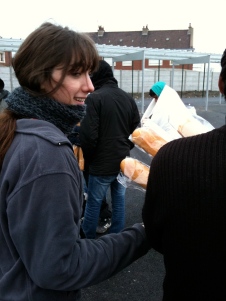

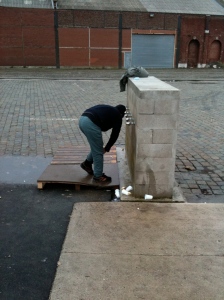
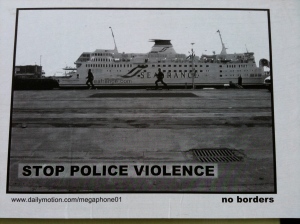
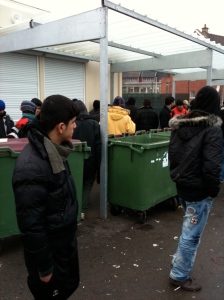
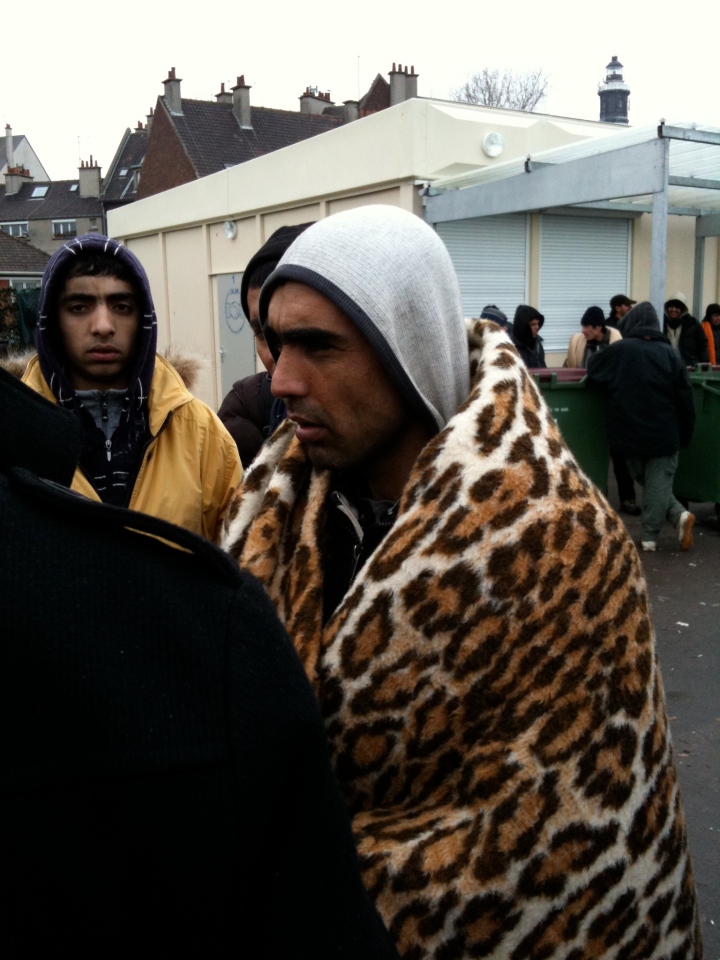

leave a comment